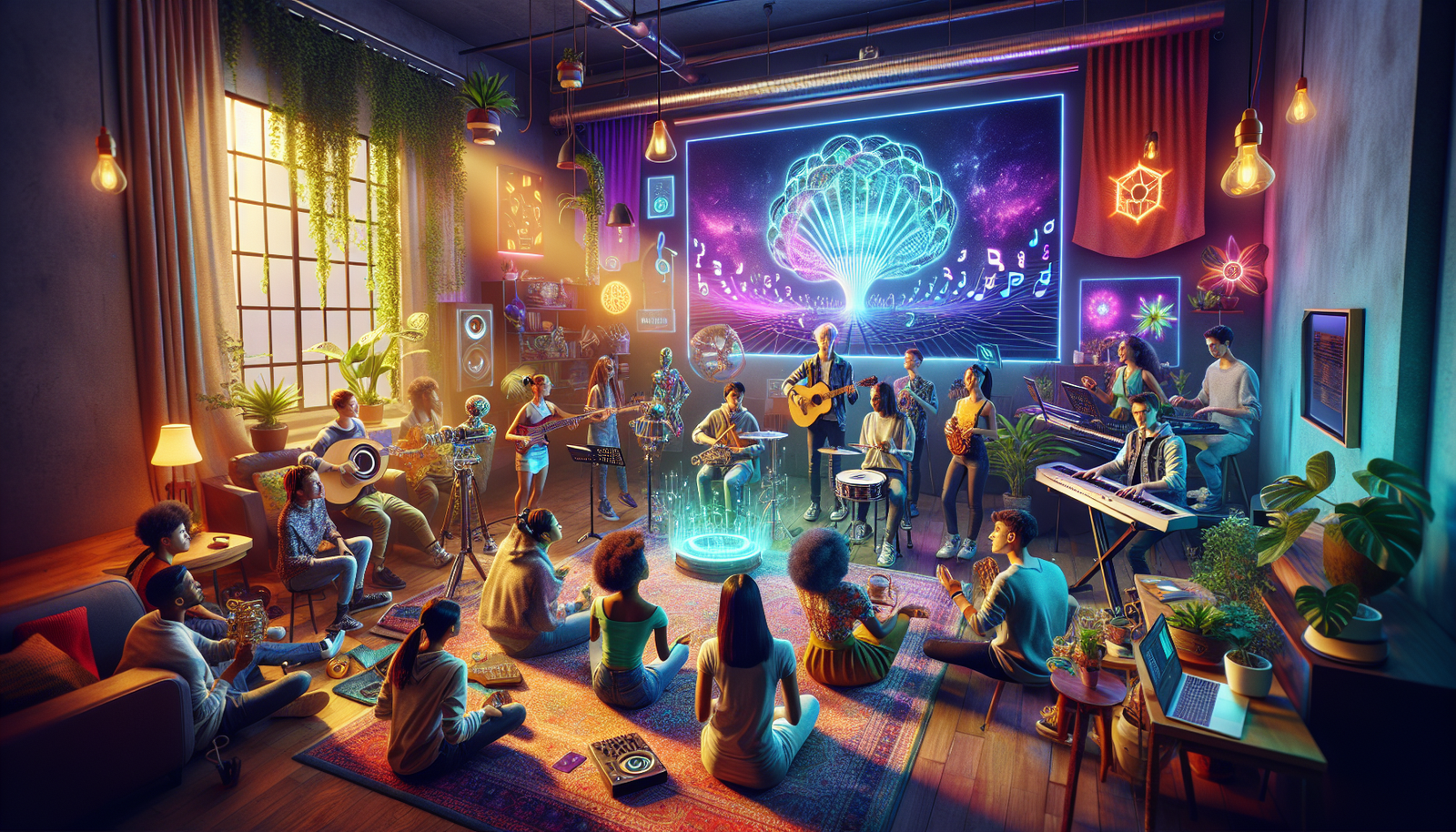Nvidia, the undisputed leader in technological innovation, is revolutionizing the music landscape with a new AI model. This bold concept transcends mere software development, offering unprecedented capability to create original musical compositions. By merging advanced algorithms and artistic creativity, this technology brings a new dimension to music production. _Artificial intelligence is now positioning itself as a creative partner_, redefining the norms of modern composition. The stakes of this technological advancement challenge both artists and the music industry.
Nvidia Presents Fugatto: A Revolution in Musical Composition
Nvidia recently unveiled Fugatto, a generative artificial intelligence model, specifically designed for musical creation. This tool promises to revolutionize the landscape of musical composition, merging technology and art in an unprecedented way. Fugatto can not only compose melodies but also transform sounds and voices, thereby facilitating the creative process for musicians and composers.
Fugatto’s Capabilities
Fugatto stands out for its ability to generate musical compositions from simple sound samples. Leveraging deep learning, this model has been trained on a wide range of musical genres, allowing it to accurately mimic various styles. Users can submit one or several sounds, and Fugatto will produce original pieces tailored to their artistic needs.
Advanced Technology Behind Fugatto
This model relies on advanced neural network architectures capable of processing vast data sets. Nvidia states that the computing power of its new artificial intelligence chips allows training models containing up to 10 trillion parameters. This technical advancement places Fugatto at the forefront of innovation in AI-assisted musical creation.
Applications and Perspectives
The applications of Fugatto go beyond mere musical creation. Artists can integrate it into music production tools, thus providing unprecedented flexibility during the design phase. From music studios to training schools, Fugatto presents immense potential to transform how music is created and taught.
Industry Reactions
Reactions to Fugatto are mixed, ranging from enthusiasm among creators to ethical concerns regarding the use of AI in music. Many voices are raised to discuss the implications of this technology on the music industry, particularly concerning intellectual property and the challenges artists may face. The question of whether AI-generated musical creations should be considered authentic art continues to spark debate.
Comparable Innovations
Nvidia is not alone in this quest for musical transformation through AI. Other models like Aiva, which composes symphonic pieces, and Suno, which generates artist voices, reflect the growing enthusiasm for applying AI in music. All these tools showcase significant progress toward a future where art and technology intertwine even more.
Ethical Issues and Future Reflections
From an ethical standpoint, the explosion of AI in music leads to a reconsideration of artistic creation. The necessity for clear regulations to protect the rights of artists and content creators seems essential. Discussions around musical AI also focus on legal challenges related to the recognition of works generated by machines.
To gain broader perspectives on these issues, it is advisable to follow legislative developments and industry debates. Platforms like Actu.ai highlight critical voices against the rise of AI in music.
Conclusion on the Impact of AI in Music
At this stage, it remains evident that the introduction of AI in music, through models like Fugatto from Nvidia, opens fascinating possibilities while raising fundamental questions about the very nature of creation. Artists, moved by these transformations, are committed to navigating these new waters, balancing innovation and tradition.
For an immersion into the technical issues, you can explore recent advancements in music technology on sites like Actu.ai.
Frequently Asked Questions about Nvidia’s Musical AI Model
What is Nvidia’s AI model capable of composing music?
It is an innovative tool developed by Nvidia that uses artificial intelligence to generate original musical compositions, relying on advanced machine learning algorithms.
How does Nvidia’s musical AI model work?
The model is trained on a vast database of musical compositions, allowing it to learn different styles, structures, and nuances to create unique pieces from minimal information.
What types of music can be composed with this tool?
The model can generate various musical genres, ranging from classical to pop, including jazz or electro, while adapting to the user’s preferences.
Is it possible to interact with the model to refine compositions?
Yes, users can provide specific instructions or examples to guide the model in creating pieces that align with their personal tastes.
What is the importance of Nvidia’s AI model in the music industry?
This model represents a significant advancement in how music can be created, opening new perspectives for artists, composers, and even applications in music production.
What are the ethical implications of using AI in musical creation?
The ethical implications include questions about intellectual property, human creativity versus AI, and the potential impact on jobs in the music industry.
How can artists integrate this technology into their work?
Artists can benefit from this model to experiment with new ideas, collaborate with AI to enrich their creative process, and even generate bases for their compositions.
Is this model accessible to the general public?
Yes, Nvidia plans to make this tool accessible to both amateur and professional musicians, with platforms designed to facilitate its use.
How do the performances of this model compare to those of other existing AI tools?
Nvidia’s model is designed to compete with other AI technologies in the music field, offering superior learning and creation capabilities due to its advanced architecture and richer datasets.






